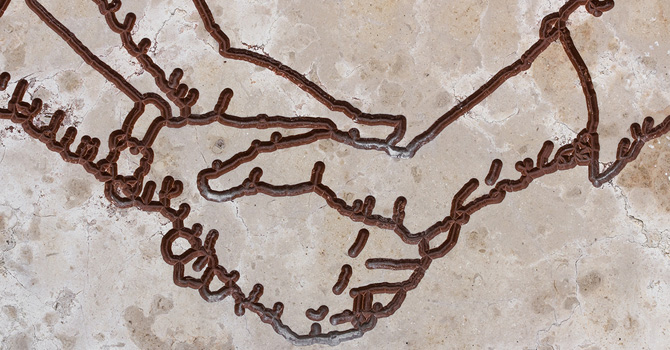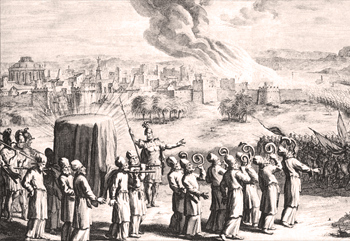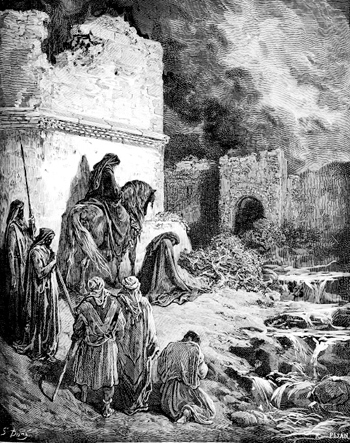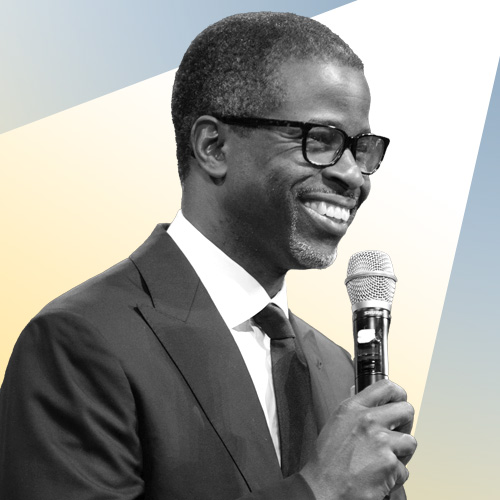Editor’s note: Faith & Leadership offers sermons that shed light on issues of Christian leadership. This sermon was preached May 14, 2010, at Duke University Chapel at Duke’s baccalaureate. To hear a recording or watch a video of this sermon, go to the Chapel website.
America is a nation of 300 million people. We all have one thing in common. We all think we’re the little guy.
Almost all of us know this story of David and Goliath, because it’s in the Jewish, Christian and Muslim scriptures, all three. And it’s made its way to the heart of our contemporary cultural imagination. Goliath the Philistine is big, beefy and belligerent. David the shepherd boy from Bethlehem steps out of obscurity, waves aside the clumsy armor offered him by Saul, the king of Israel, and, taking five smooth stones and a slingshot, leaves Goliath biting the dust. You can bet that 99 percent of people who read this story identify with David. We all think we’re the little guy. And in movies, athletics, business and politics, we all feel the pull of that righteous cultural conviction: Stand up for the little guy.
Everyone loves the movie where the small-town attorney takes on the sprawling multinational conglomerate that’s poisoning the water in the local streams. Everyone cries in the final frame of the film when she clenches her fist in victory. We all love to see the small liberal arts college fight through to the Final Four to take on the big state school powerhouse. It makes everyone feel great.
But hold on. Let’s take a reality check. This is Duke. We did get to the final game of the NCAA. But we weren’t the little guy. And we’ve been to those cultural criticism classes. We know the inspiring movie about the resilience of the little guy has been made by exactly the kind of giant, faceless corporation the attorney in the movie is standing up against.
So why do we still say we like the little guy? We want our movies to be about David, but we spend our lives trying desperately hard to be Goliath. We think it’s quaint and clever that David got by with five smooth stones and a sling, but we spend our own energies stockpiling swords and spears and javelins. We admire the fact that David forswore Saul’s armor and gadgetry, but just look at our car, just look at our house, just look at our country: we’ve beefed them up to look like Goliath, with so many safety and security features we can hardly move around in them.
You’ve just spent four years of your time and energy, the academic world’s best facilities, books and teachers, and a large swath of someone else’s money acquiring the prestigious social and economic entry ticket known as a Duke degree.
But think for a moment. Why is a Duke degree so coveted? Because it gives you a chance to be Goliath. It gives you the armor. It gives you the weaponry. It gives you the respect. It gives you the acclaim. All the things Goliath had. All the things David didn’t have.
Here’s David, full of confidence, full of faith, full of hope, telling Saul he doesn’t need the heavy armor and telling Goliath he doesn’t need the mighty power. David defeated Goliath. And what happened next? The people swung behind David. David became king. But it didn’t stop there. Gradually a terrible irony began to take shape. David became Goliath. David became a bully. David became a merciless military powerbroker. David became a ruthless acquisitor of pleasure and advantage. David became the overblown beached whale he’d begun his career by destroying.
Just like Elvis Presley, for whom fame and fortune turned gyrating hips into bloated cheeks, David became Goliath. What a tragedy that was.
Is that going to happen to you? Are you going to leave this chapel today as David, and spend the next 10 or 20 years slowly turning into Goliath? Are you going to make this Duke degree the first of many items of armor, so that you look back in a bunch of years’ time and wonder whatever happened to the David you are today? Or is there another way?
How are you going to avoid losing your soul? That’s what we’re talking about. When everyone in the world seems to admire and fear Goliath, with all that muscle and armor and big talk, and all your advisers are like Saul, saying, “Here’s all this armor; you’d better put it on; you’re going to need this round here,” how are you going to remain true to yourself and what you believe in?
Maybe this is the best moment of your life to think about where power really comes from. David’s power lies in his five smooth stones. And this story shows us five sources of power. David’s power. God’s power. And your power. Let’s turn these five stones over in our hands together for a moment. Those stones hold the secret of where true power is to be found.
Stone No. 1 for David is, he has made his peace with ordinary time. He knows how to put his own needs and desires to one side for an extended period to do hard, unglamorous work. That’s what David does in the first part of this story. He looks after his father’s sheep, and takes provisions to various commanders of the army. Some parts of every life, and every part of some lives, are unrewarding, unregarded and unattractive.
Most of you will doubtless spend some part of your life caring for young children, being unemployed, recovering from surgery, doing a job that has no glamour or acclaim. That’s when you face one of your defining moments. Either you learn the rhythm of the everyday, or you lapse into a sequence of escapist thrills punctuated by hours and days of resentment. David finds a way to make the ordinary into a source of pride, the everyday into a form of training, the mundane into a way to build relationships. That’s where he gets his power.
Is that where you get your power?
Stone No. 2 for David is, he has made friends with the outdoor world. David doesn’t rely on technology or physical advantage. He has spent his life outside. He knows how to keep sheep. He knows where to find smooth stones. He knows how to craft a sling. Goliath has no idea about these things. If you want to be like David, ask yourself, “When was the last time I felt the joy of nature and sharpened my wily wits by spending some time in the fields, in the streams, in the mountains? Have I so surrounded my life with gadgets and comforts and appearances and armor that I’ve forgotten the skills money can’t buy?” Some tricks you will never pick up in an office, a laboratory or a library. David learns from his outdoor life the wisdom of the owl, the cunning of the fox, the agility of the wildcat, the sharp eye of the eagle. That’s where he gets his power.
Is that where you get your power?
Stone No. 3 for David is, he knows himself. Saul assumes David should be as much like Goliath as possible. So he gets out the full set of armor -- bronze helmet, coat of mail, hefty sword. But David knows who he is. He knows he’s not Goliath. And he knows he’s not Saul. If you’re feeling burdened and heavy laden right now, is it because you’re wearing someone else’s armor? Are you trying to be someone you’re not and never will be? I wonder if that person you’ve spent your life trying so hard to please is here today. How’s it working out for you? Strive to be what only you can be. Don’t be a second-rate version of someone else. Not your dad, not your professor, not your sister, not your friend.
God made you the way you are because he wanted one like you. David knows there’s no point putting on Saul’s armor. Of course, Saul might think he is being disrespectful, taking unnecessary risks, letting him down. But David knows there’s no use trying to be Saul. David knows his own weaknesses. And he knows his own strengths. That’s where he gets his power.
Is that where you get your power?
Stone No. 4 for David is, he knows who God is. David knows Goliath is not God. Goliath is the reality in front of him right now, and that reality is big, ugly and intimidating. But David knows what’s in front of him isn’t ultimate reality.
Let me tell you another tragedy of this story. How has it happened that Christians in this country have lost so much of the respect and trust of people of other faiths and of no expressed faith? I’ll tell you how it has happened. It has happened by Christians turning Jesus into Goliath. And that’s a tragedy. Jesus is not a cosmic or political or cultural bully. Jesus is not Goliath. Whatever your view of truth -- faith or no faith -- Goliath is not God. David knows that. David knows where the secret of the universe lies, and it’s not with Goliath. That’s where David gets his power.
Is that where you get your power?
Finally, stone No. 5. David knows what power fundamentally is. Look at what we’ve learned from the first four stones. Know time. Know the world. Know yourself. Know God. All being well, these are the things your four years of study here have taught you. A Duke education has made you powerful. But where does that power reside? Not in Goliath’s bravado but in David’s skill. Not in Goliath’s muscle but in David’s faith. Not in Goliath’s plausibility but in David’s truth. Not in Goliath’s armor but in David’s wisdom.
If the last four years have taught you what to do with time, how to be in the world, who you really are, and what to believe in, they’ll have given you real power. They’ll have given you the power of David, a power nothing and no one can take away from you. David lost sight of that power, later on. Most of us do, for a season. And when we lose sight of that power, that’s precisely the moment when we’re drawn to Goliath. In the end Goliath’s problem is not that he’s too strong but that he’s too weak. The more we try to become Goliath, the weaker we become. It shows we’ve lost sight of where true power lies.
Class of 2010, treasure this degree. Don’t turn it into armor or weaponry, to protect yourself or damage others. Treat it as five smooth stones. Let it show you what time, the world, yourself, God, and power really are. Cherish those five stones. Use them wisely. Hold them close to you, and hear David whispering to you: “You don’t need to become Goliath.”
Bless you, class of 2010. You have a power that Goliath will never know.














